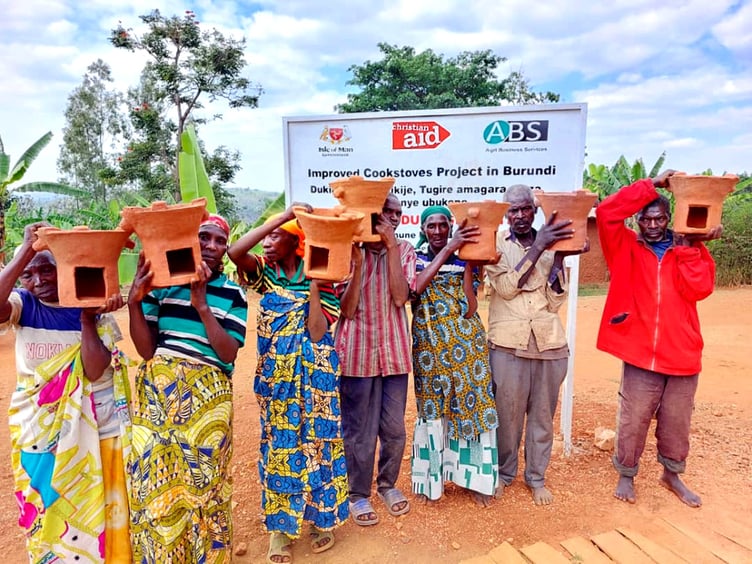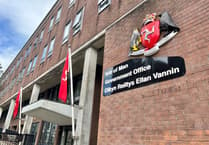This week celebrates Christian Aid week.
It’s a week of fundraising throughout the island to support work in the East African Republic of Burundi.
Burundi is a small African country in the central east of the region and is about a third of the size of Scotland.
It’s a landlocked country, with Rwanda to the north, Tanzania to the east and south and the Democratic Republic of Congo to the west and part of the south.
Ms Whitelegg said: ‘When we think of Africa, we perhaps think of dry arid conditions, but in fact Burundi is a lush green country with the world’s longest freshwater lake – Lake Tanganyika.
‘Yet, the UN considers Burundi one of the least developed countries in the world and the poorest nation in the world.’
Burundi has 87% of its population living below the world bank’s poverty measure of $1.90 a day, with 80-90% of the population relying on subsistence farming, youth unemployment stands at 65% and 56% of children under five are malnourished.
The country is dealing with a long legacy of issues, German/Belgium colonial rule, civil war and political unrest.
‘That being said, life is currently relatively calm in Burundi, which means it has become home to refuges from neighbouring countries, further stretching resources,’ Ms Whitelegg continued.
‘The Isle of Man has had a relationship with Burundi since 2014, with the government awarding international aid grants to Christian Aid and Send a Cow (now Ripple Effect).
‘Some may remember Harry Owen’s epic beekeeping mission in 2018.’
The beekeeper from St John’s travelled to Burundi to provide tips to help improve beekeeping there and increase the yields of better-quality honey.
He provided training on how to make beehives and protective clothing for more women and young people – who would traditionally be excluded from such practices.
Christian Aid is ensuring that the good works continue this week.
A better way of cooking
In Burundi the women bear the weight of the cooking and household chores.
Cooking is laborious and dangerous. It is done by trapping a small fire between two or three smooth stones on which a pan is balanced.
First, sufficient fuel needs to be found. As it is illegal to chop down trees, women and children spend hours searching for burnable material, such as twigs, leaves, stems.
It then takes an age to heat the water, filling the home with smoke and this method is prone to causing accidents.
A modern design clay cookstove is a ‘game changer’ for cooking in Burundi, says Ms Whitelegg.
It’s cleaner to use – reducing deaths and illness from smoke, reduces air pollution, and they are safer in the home for children and livestock.
Ms Whitelegg said: ‘Importantly, they save time in collecting the fuel and in cooking.
‘The vision that Christian Aid has is that in providing the opportunity and support people can work their way out of poverty and live a self-sufficient and dignified life.
‘Charity needs to be sustainable.
‘I believe that to make an effective change any intervention that we make as a charity must be sustainable – it has to be able to stand on its own without the charity overseeing the project indefinitely.’
The ‘improved cookstove’ project has involved securing two plots of land (north and south), commissioning the building of kilns and outbuildings.
Whilst this was happening the project beneficiaries were formed into a legal cooperative.
They were supported throughout the whole process with administration, training, and guidance.
When the cooperatives are ready to be independent of charity assistance, elections will be held of their members to run the venture independently.
Ms Whitelegg added: ‘The members of the cooperative are trained in how to manufacture the cookstoves, and in marketing and finance.
‘The first 500 cookstoves produced have been gifted to the families in the local area who are in the most need.
‘Once the cookstoves are ready for sale, all funds will go through the cooperatives and be paid back to members in the form of dividends.
‘It is also the function of the cooperative to provide micro loans to those women who cannot afford to purchase a cookstove out right.
‘It’s a project designed for longevity and something the Isle of Man should be very proud of.
‘The beneficiaries are numerous, not only the direct members of the cooperatives and their families, but also the women and families who have a new way of cooking.’
Success stories are already being received from the northern project with reports of women setting up small roadside businesses cooking food for passers-by on their new improved cookstoves, according to Ms Whitelegg.
She said: ‘What starts with the donation of a couple of Manx pounds, ends with cleaner, safer cooking and priceless dignity, and being able to support yourself and family.
‘Christian Aid’s improved cookstoves project is an ambitious one, yet has only been made possible, with the support of the Manx public and the Isle of Man Government grant scheme, for which we are very grateful.’
To learn more about the work Christian Aid does, contact Ms Whitelegg on 474275 or [email protected]
To make a donation this Christian Aid week, get in touch or transfer direct to Lloyds: Christian Aid IoM, Acc 46820160, Sort 30-12-80.





Comments
This article has no comments yet. Be the first to leave a comment.